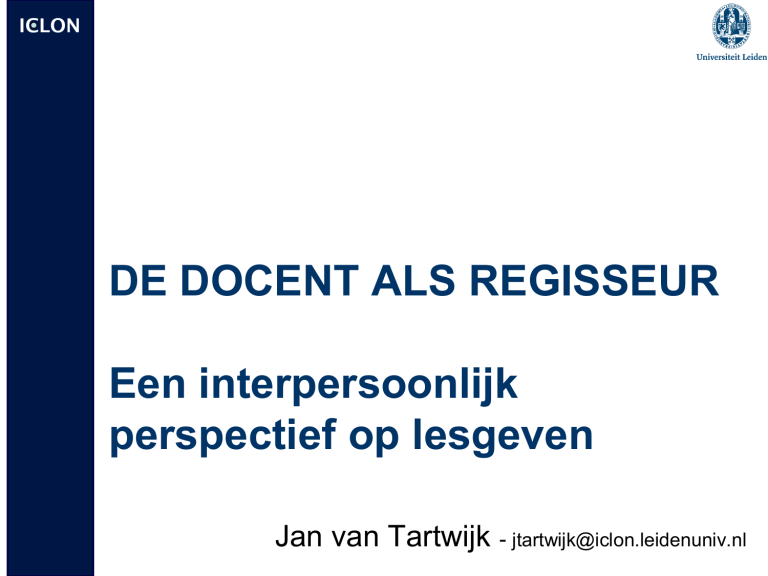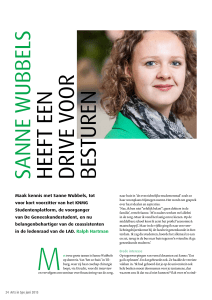
ICLON
DE DOCENT ALS REGISSEUR
Een interpersoonlijk
perspectief op lesgeven
Jan van Tartwijk - [email protected]
ICLON
Kijken naar docent in de klas
• Inhoudelijk perspectief
– Wat wordt behandeld? Etc (Canon)
• Vakdidactisch perspectief
– Hoe wordt inhoud behandeld? (Begrip)
• Pedagogisch perspectief
– O.a Welke ‘waarden’
• ……
• Interpersoonlijk perspectief
– Wat zijn de gevolgen van gedrag van de leraar
voor relatie met leerlingen?
ICLON
Een interpersoonlijk perspectief
Watzlawick, Beavin & Jackson (1967)
• Een systeem benadering van
communicatie
– Ontwikkeld in de context van de
gezinstherapie
• Alcoholist wordt behandeld en komt terug ….
– Toegepast in de klas
• “Raddraaier” wordt verwijderd ……
ICLON
Sociaal system
• Coherent, stabiel complex van relaties
Watzlawick, Beavin & Jackson (1967)
• Resistent tegen verandering
– Feedback mechanismen
• De “raddraaier”
• Posities/rollen verschillen per systeem
– Simon: Familie, klas, voetbalteam
– Leerlingen
• Zelfde klas + verschillende leraren =
verschillend leerlingengedrag
– Verschillend gedrag binnen/buiten de groep
ICLON
Ontwikkeling sociaal systeem
• Drie niveaus
– Van gedrag
– Inhoud
– Interpersoonlijke boodschap
– Naar interactie
• Interpersoonlijke boodschappen uitwisselen
• Wederzijdse beïnvloeding van gedrag
– “Onderhandelen” over positie in systeem
– Naar relatie
• Na een tijdje patronen
– Gedrag gestuurd door beeld positie van de ander
– Circulaire processen in uitwisseling interpersoonlijke
boodschappen
– Resistent tegen verandering
ICLON
3 Niveaus van communicatie
Relatie
Gedrag
Gedrag
Perceptie
Perceptie
Gedrag
Gedrag
Perceptie
Perceptie
Gedrag
Gedrag
Perceptie
Perceptie
Gedrag
Gedrag
Perceptie
Perceptie
Gedrag
Perceptie
Zelf Perceptie and Perceptie van de leraar
Interactie
Zelf Perceptie en Perceptie van de leerlingen
Gedrag
Video
ICLON
GEDRAG
ICLON
Interpersoonlijke betekenis van gedrag:
2 dimensies
Boven
Aardrijkskunde
1
Invoed
Aardrijkskunde
2
Maatschappijleer
Tegen
Nabijheid
Samen
Leary, 1957
Créton & Wubbels, 1984
Frans
Nonverbal
Geschiedenis
• Space
• Body
Engels
• Face
• Eye contact
• Voice
Duits
Onder
ICLON
Nonverbaal gedrag van leraren
Face
Space
Body
Visual contact
Voice
4
A
3
Dominance
Van Tartwijk, 1993
Wubbels, den Brok, Brekelmans& van Tartwijk, 2006
A
A
B
A
B
C
B
C
C
2
B
D
D
D
unclear
1
A: Visible
B: Invisible
A: Frontal
Unable to touch
B: Also non-frontal
Unable touch
C: Frontal
Able to touch
D: Also non-frontal
Able to touch
A: Upright
Moving
B: Upright
Static
C: Bend
Moving
D: Bend
Static
A: Entire
fragment
B: Almost entire
fragment
C: Six seconds
or less
D: No visual
contact
Volume
High
Moderate
Low
Silent
Duration
Entire frag.
Half the frag.
ICLON
Literature
•
Ball, S. J. (1988). Initial encounters in the classroom and the process of establishment. In P. Woods (Ed.), Pupil strategies:
Explorations in the sociology of the school (pp. 143-162). London: Croom Helms Ltd.
•
Berliner, D. C. (1994). Expertise: The wonder of exemplary performances. In J. N. Mangieri & C. Collins Block (Eds.),
Creating powerful thinking in teachers and students (pp. 161-186). Forth Worth, TX: Holt, Rinehart & Winston.
•
Brekelmans, M. (1989). Interpersonal teacher behaviour in the classroom, in Dutch: Interpersoonlijk gedrag van docenten in
de klas. Utrecht: W. C. C.
•
Brekelmans, M., Wubbels, T., & van Tartwijk, J. (2005). Teacher-student relationships across the career. International
Journal of Educational Research, 32(1-2), 55-71.
•
den Brok, P. (2001). Teaching and student outcomes. Utrecht University, Utrecht.
•
Tracey, T. T. (1994). An examination of the complementarity of interpersonal behavior. Journal of personality and social
psychology, 67(5), 864-878.
•
van Tartwijk, J. (1993). The interpersonal significance of nonverbal behaviour in the classroom (in Dutch: De
interpersoonlijke betekenis van nonverbaal gedrag van docenten in de klas). Utrecht: WCC.
•
van Tartwijk, J., den Brok, P., Veldman, I., & Wubbels, T. (in press). Teachers’ prcatical knowledge about classroom
management strategies in multicultural classrooms in the Netherlands. Teaching and Teacher Education
•
Watzlawick, P., Beavin, J. H., & Jackson, D. D. (1967). The pragmatics of human communication. New York: Norton.
•
Watzlawick, P., Beavin, J. H., & Jackson, D. D. (1970). De pragmatische aspecten van de menselijke communicatie.
Deventer: Van Loghum Slaterus.
•
Wubbels, T., Brekelmans, M., den Brok, P., & van Tartwijk, J. (2006). An interpersonal perspective on classroom
management in secondary classrooms in the Netherlands. In C. Evertson & C. Weinstein (Eds.), International handbook on
classroom management (pp. 1161-1191). New York: Lawrence Erlbaum Associates.
•
Wubbels, T., Creton, H., & Holvast, A. (1988). Undesirable classroom situations: A systems communication perspective.
Interchange, 19(2), 25-40.












